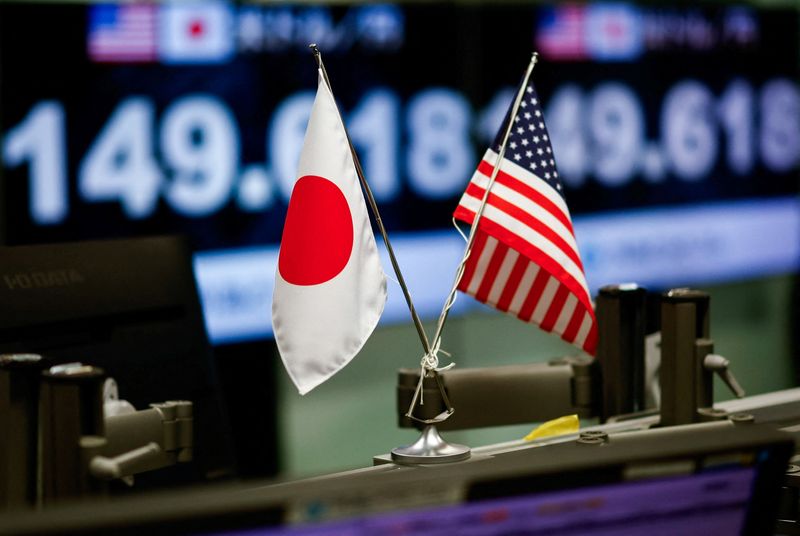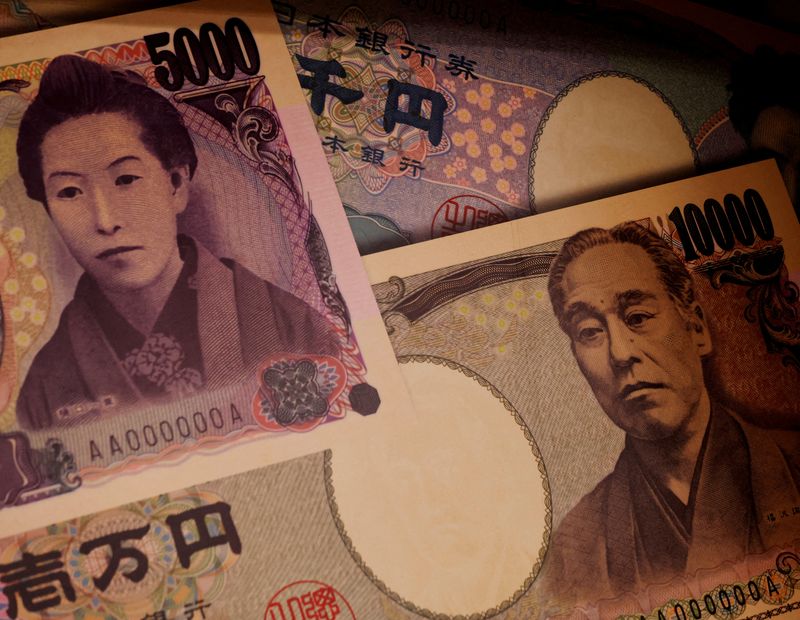TOKYO (Reuters) -Japan is suspected to have intervened in the foreign exchange market to prop up the yen on several occasions this month, underscoring its discomfort over the pain the currency's fall is inflicting on households because of costlier imports.
While the authorities have not confirmed whether they stepped in, the following explains Tokyo's intervention tactics and what the move could mean for Japan's monetary policy:
WHY DID THEY STEP IN?
The yen had languished at 38-year lows past 160 per dollar before the suspected bout of intervention, making policymakers increasingly worried that higher import costs may hurt weak private consumption.
The weak yen is already taking a toll on Prime Minister Fumio Kishida's approval ratings ahead of a ruling party leadership race expected in September.
Leaving the yen's slide unattended would have risked giving markets the impression Tokyo will turn a blind eye to speculative moves that were out of line with fundamentals.
WHAT'S DIFFERENT THIS TIME?
Unlike past episodes of intervention that typically came in the midst of sharp declines in the yen, the suspected intervention on July 11 came when the dollar was already sliding in reaction to weak U.S. inflation data.
This suggests Tokyo attempted to seize the moment when the market's tide was already moving in favour of the yen. Rising prospects of a near-term U.S. interest rate cut would also allow Japan to argue that further yen falls against the dollar did not reflect fundamentals, and justify intervening.
Some analysts say the change in tactics may have been aimed at keeping markets guessing as to when the authorities could step in again. Top currency diplomat Masato Kanda said there was no set time period over which to judge if yen moves were excessive.
A media report that Japan conducted rate checks against the euro/yen also spooked markets, as it is rare for Tokyo to conduct intervention against the single European currency.
WHERE IS THE LINE-IN-THE-SAND?
Authorities say they have no specific levels in mind. But traders estimate 160 yen per dollar as Japan's line-in-the-sand that heightens the chance of intervention.
For example, Tokyo spent 9.8 trillion yen ($62.7 billion) intervening in the foreign exchange market at the end of April and early May, after the Japanese currency hit a 34-year low of 160.245 per dollar on April 29.
The yen has since fallen to a 38-year low of 161.96 per dollar on July 3, before last week's suspected bout of intervention pushed it back below the 160 line.
WHAT ELSE COULD TRIGGER MORE INTERVENTION?
Rising import costs from a weak yen threaten to derail the administration's efforts to turn inflation-adjusted wage growth positive, and give households more purchasing power.
If public anger over the inflationary impact from a weak yen heightens, that could raise political pressure on authorities to step in again to arrest the currency's declines.
WILL TACTICS CHANGE UNDER NEW LEADERSHIP?
Incumbent top currency diplomat Masato Kanda, who led massive bouts of yen-buying intervention in 2022 and 2024, has been known to aggressively warn markets against pushing down the yen.
Kanda will see his term end in July and will be succeeded by Atsushi Mimura, a financial regulation veteran whose views on currency policy are little known.
Japan's exchange-rate policy is likely to remain broadly unchanged under a new currency chief. The communication style may differ, though, as some diplomats tend to offer more explicit warnings to markets than others.
HOW COULD LATEST INTERVENTION AFFECT BOJ POLICY?
Markets are divided on how Tokyo's latest foray into the market could affect the Bank of Japan's decision on whether to raise interest rates at its policy meeting on July 30-31.
The BOJ could feel pressured to cooperate with the government's efforts to slow the yen's declines by deploying a double hawkish surprise of quantitative tightening and a rate hike.
But doing so could give markets the impression that yen moves are key drivers of its rate decision. That is something the BOJ wants to avoid, as it would go against central bank protocol not to use monetary policy as a tool to directly control currency moves.
If the latest bout of intervention succeeds in reversing the market's weak-yen tide, that may give the BOJ more flexibility in timing the next rate hike, analysts say.

In Japan, the finance ministry decides whether to intervene in the currency market with the central bank acting as its agent.
($1 = 156.3200 yen)
